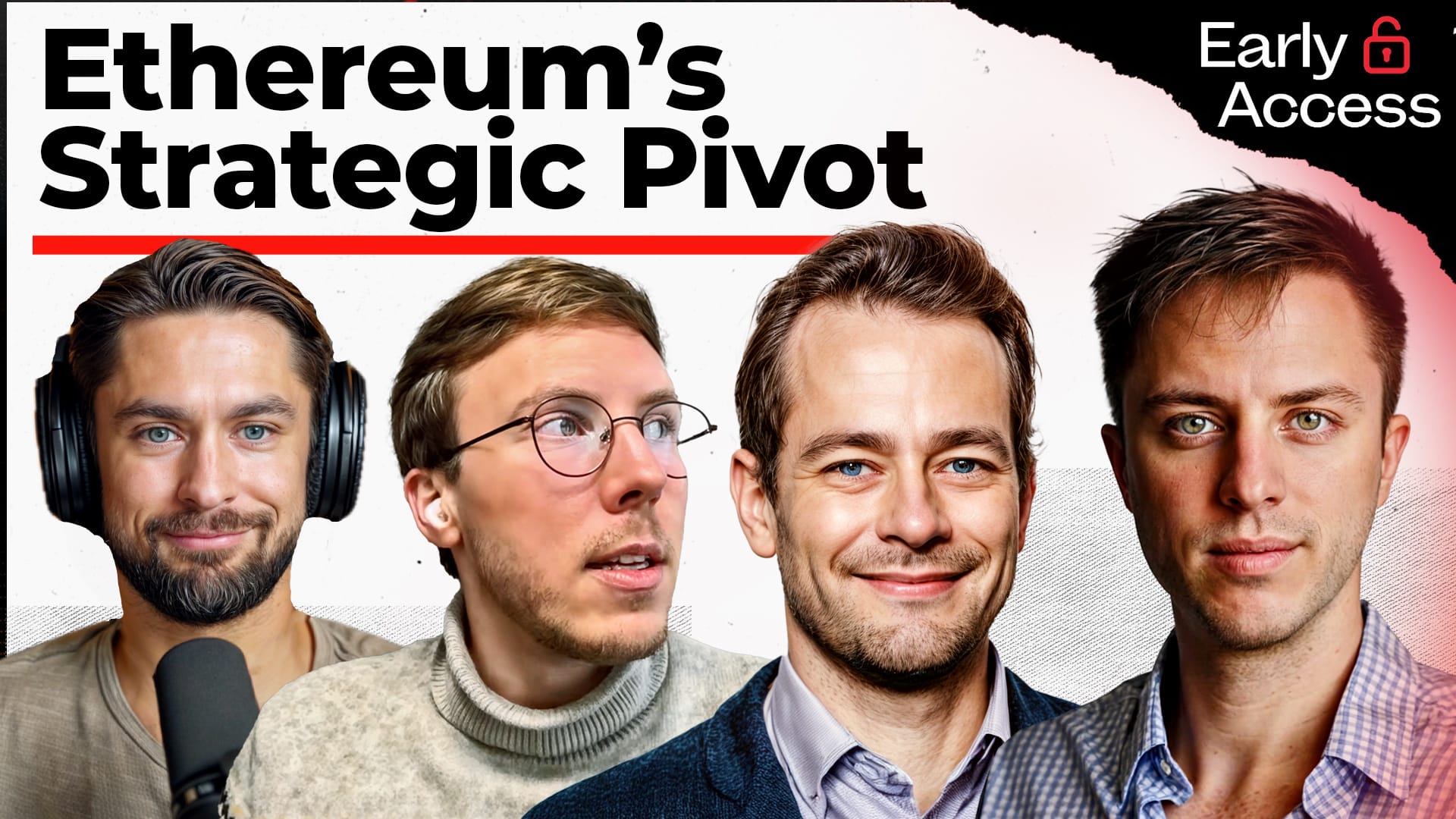The gargantuan ship of Ethereum is slowly turning itself around.
Since 2023, a sense of urgency has been building within the Ethereum community concerning the need to change. Now, pinpointing the issues and determining how that change needs to occur has been its own challenge.
Ethereum is comprised of many different components, with different voices and incentives contributing to the conversation of where it goes next. Coordinating this conversation and finding consensus has never been easy.
This week, I recorded an episode with Ansgar and Dankrad, researchers from the Ethereum Foundation, with help from fellow podcaster Mike Ippolito. Dankrad and Ansgar have already made a lot of progress in defining the problem space while identifying ways that the community can fix said problems.
This episode is out now on the premium feed!

Below, we aim to digest their progress into a quick-and-dirty framework for understanding where Ethereum is falling short and what is already being done to put the ship on the right path.
Ethereum’s Strategic Misalignment
At the core of Ethereum’s issues is a misalignment between long-term ideals and short-term execution. Ethereum has always been long-term research-oriented, and with the absence of real competitive pressures for most of its history, the downsides of this have never been an issue.
However, in 2021, the environment changed. Crypto graduated to becoming real, and the luxury of being a peace-time research project became Ethereum’s greatest weakness, exploited by its competition.
There isn't one central issue defining Ethereum’s problem space – it has many complex challenges. The network's structural over-indexing on long-term ideals has led to breakdowns across its techno-social stack. Here are the most notable problem areas identified in our conversations with Dankrad and Ansgar:
- L1 Underinvestment
- Product Mindset Deficiency
- Leadership Vacuum
- Ivory Tower Culture
- L2 Fragmentation
- Slow Adaptation
Blocking and Tackling
Those are some big problems to tackle. But the good news is that, to realign Ethereum towards successful outcomes, all it needs to do is return to basics – promoting user experience, scale, developer support, and stronger coordination. A little operational discipline will go a long way, and Ethereum has already made progress across all of the fronts that were previously giving malaise.
Each of the above vectors is already being addressed head-on:
1️⃣ Aggressive L1 Scaling Plan
Ethereum is finally reinvesting in Layer 1 growth. There is an updated roadmap with more aggressive scaling plans. Ethereum currently wants to increase gas limits 10x over 2 years. It has tricks to create instantaneous transactions:
- Performance-Enhancing Upgrades: In the short term, Ethereum is targeting a jump from 36 million gas to 100 million by the end of 2025. In the medium term, the Glamsterdam hard fork (~1.5 years out) aims to push that even further to 300 million gas via upgrades like delayed execution and access lists.
- zk-Based Systems to Scale L1: The biggest unlock comes from zkVMs, which shifts the L1 itself toward rollup-like architecture and scale. With zkVMs, nodes verify succinct proofs instead of re-executing transactions. Potentially live in late 2026, the Ethereum L1 will grow at 100x capacity without sacrificing decentralization. What was once long-term research is now a medium-term engineering problem.
2️⃣ User-Centric Development
Ethereum is evolving from a protocol-first mindset to treating itself as a product. New leadership and internal roles (e.g., Josh Rudolf) are being empowered to prioritize UX and developer needs.
3️⃣ Leadership Vacuum → Strategic Direction
Historically a passive funder, the Ethereum Foundation is now stepping up as a strategic coordinator. The appointment of co-executive directors Tomasz Stańczak and Hsiao-Wei Wang marks a new era of accountability, direction, and internal cohesion.
4️⃣ Opening the Doors to the Ivory Tower
The Ethereum Foundation is de-emphasizing its closed-door, research-heavy culture. Internal discussions are now more inclusive, and ecosystem voices are being actively welcomed into roadmap and product conversations. Communication across the organization has notably improved.
5️⃣ Better Interop + Based/Native Rollups
Ethereum is developing interoperability standards and shared tooling while incentivizing tighter L1 integrations via based and native rollups. The culture around Ethereum is shifting from alignment-cudgeling to positioning Ethereum L1 as a service provider to L2s.
6️⃣ Slow Adaptation to Competitive Pressure
Ethereum is acknowledging the need for more urgency with protocol upgrades. Ethereum is now embracing shorter roadmap cycles and execution urgency. Originally, Ethereum’s adaptability stood in contrast to Bitcoin’s rigidity. Now, Ethereum is understanding the need for meta-adaptation – adapting the roadmap to fit current demands.
Ethereum's 'Pivot' Cheat Sheet
The purpose of this post is to distill and clarify the strategic changes happening in Ethereum, so that the broader community can get onboard, and we can move the conversation forward more rapidly. In pursuit of that goal, here is a cheat sheet!
| Problem | What Went Wrong | How It’s Being Addressed | What’s Changing |
|---|---|---|---|
| L1 Underinvestment | L1 under‑prioritized in favor of far‑future rollup vision | Aggressive roadmap to scale L1: 10× gas over 2 years, ZK proofs, delayed execution | L1 is back in focus as Ethereum’s economic and functional center |
| Product Mindset Deficiency | Built for ideals, not users; ignored UX, apps, and builders | Shift to user‑ and app‑focused thinking; new roles like product leads introduced | Ethereum is being treated like a product, not just a protocol |
| Leadership Vacuum | EF avoided directional leadership; no one owned Ethereum's vision | Tomasz and Hsiao‑Wei appointed as EDs; EF taking strategic responsibility | EF now has leadership structure and mandate to guide Ethereum holistically |
| Ivory Tower Culture | Insular, academic research disconnected Ethereum from builders and users | EF culture is shifting toward openness, wider participation, and more transparent communication | Broader collaboration inside EF and across the ecosystem |
| L2 Fragmentation | Rollups feel like separate chains; poor UX, interop, and branding | Invest in interop standards, promote native/based rollups, treat L1 as a service provider | Tighter integration between L1 and L2s, making them feel like one coherent system |
| Slow Adaptation | Ethereum was slow to adapt while Solana and others optimized for product‑market fit | Ideological resistance fading; faster roadmap cadence; willingness to execute on short‑term wins | Culture is shifting from passive to proactive; Ethereum is in execution mode |
For those wanting to dive deeper into the problem space and hear from Ansgar and Dankrad directly, our episode discussing Ethereum re-alignment has just gone live in Early Access for Citizens (watch here). For free listeners, check your podcast feed next week!
The Role of the Ethereum Community
A big takeaway from the episode with Ansgar and Dankrad: the EF is stepping up to fulfill its end of the bargain. Now, the Ethereum community has a role to play in its evolution, too.
Parts of the Ethereum community have been pushing for this shift, while others have been resisting it. Ethereum is a big tent that holds space for many different voices. There is no homogenous "Ethereum community," but rather a diverse set of voices on a spectrum of competing or aligned visions for what Ethereum could be.
As Ethereum adapts, so will the Ethereum community. Our voices need to change with it. The messaging around Ethereum needs to update to reflect the changes being made.
I have an IPA-fueled article that comes out next week that offers my vision on what Ethereum messaging should look like to align with some of the changes identified in this article.
Stay tuned, I’m excited for it to come out!
David

